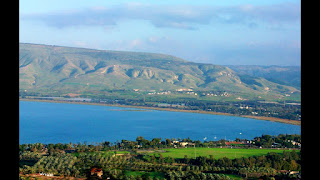The Two Songs of Luke's Gospel Chapter One

(Painting of Mary and Elizabeth) Introduction I’ve been thinking about the two songs in the opening chapter of the Gospel of Luke. One is from Mary the mother of Jesus, and the other is from Zechariah, the father of John the Baptist. I think that in these two songs we find some key themes that Luke repeats throughout his gospel in his description of the ministry of Jesus. As always, when interpreting the New Testament, I’m trying to focus on how the first century Jewish people living under Roman occupation in Israel would have heard and understood these words. I’m not doing a detailed study here, just a brief sketch. All Scripture passages are from the English Standard Version. Mary sings her song as a response to being greeted by her relative Elizabeth in the Judean hill country. Both women are pregnant with their firstborn child. Elizabeth, an older woman past the normal age of childbearing, will soon miraculously give birth to John the Baptist. Mary, who is a virgin, will

